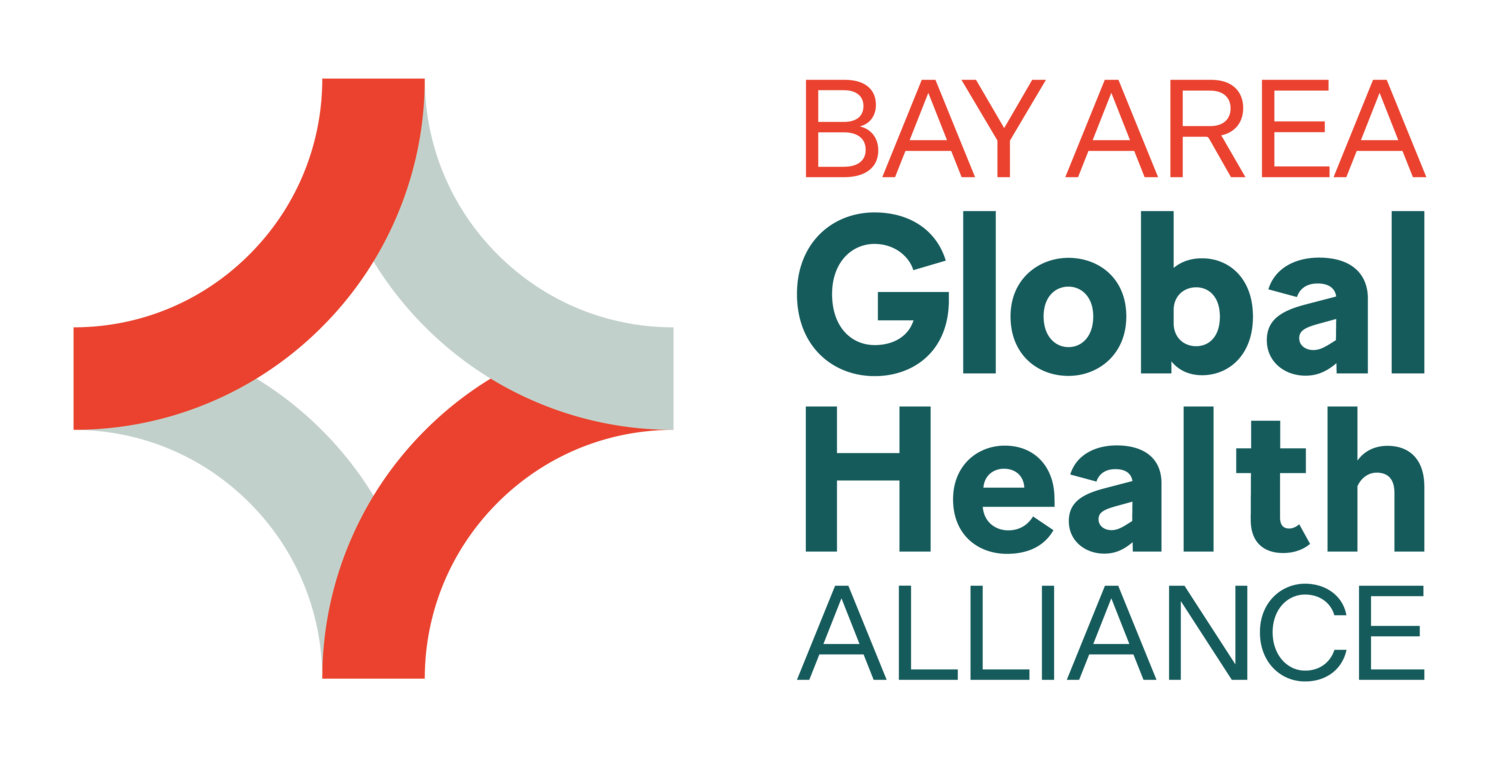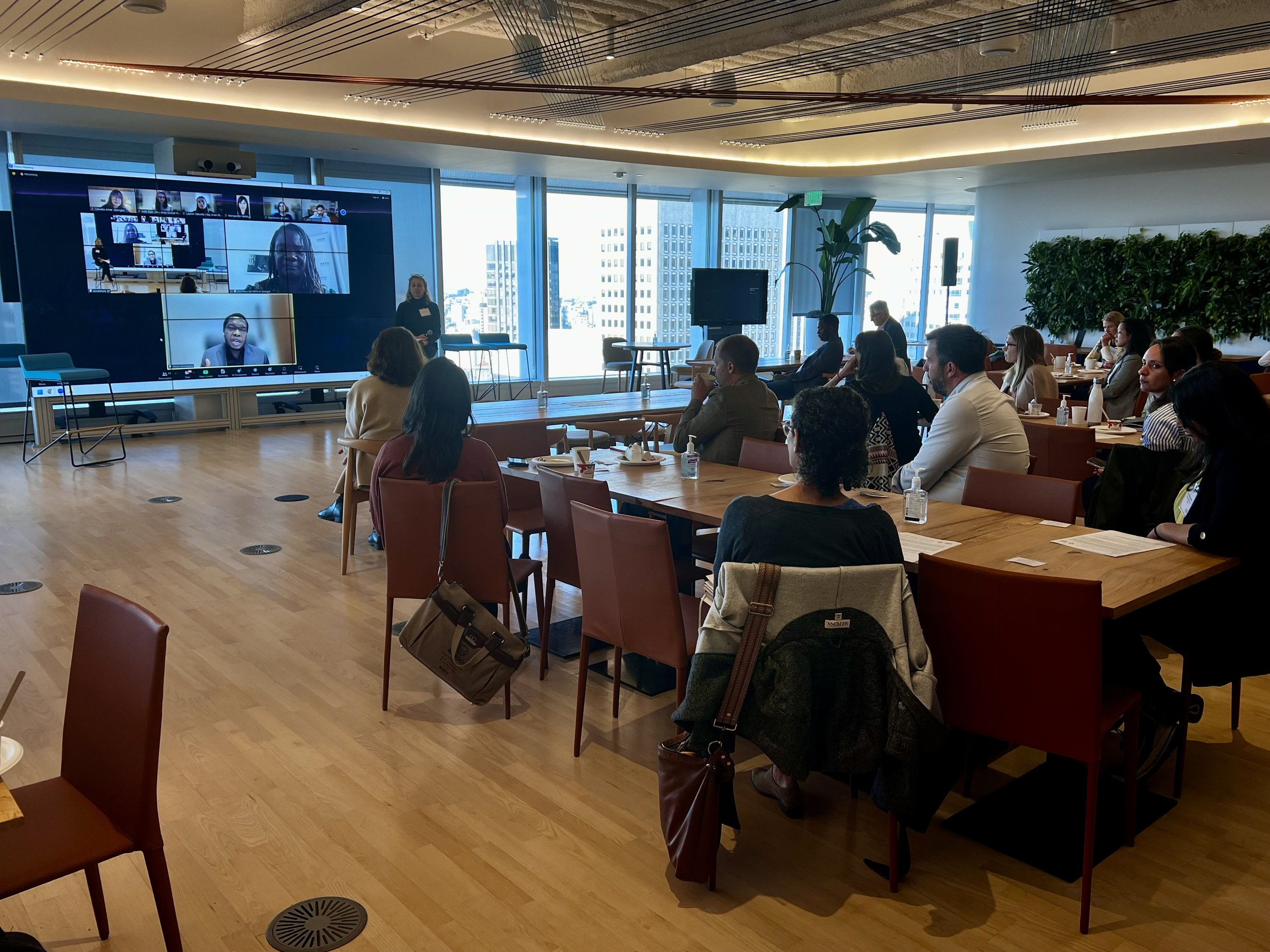You can access the first hour recording of Insights to Action: Ideation on Implementation for Equity here and the follow-up discussion (except the breakout discussions) here.
Too often, promising health interventions do not reach the world’s most vulnerable or are not effectively adapted to community needs and constraints. This often results in critical needs remaining unmet and growing health inequity, despite significant investment seeking to address these issues. On Thursday, October 26, 2023, the Bay Area Global Health Alliance’s Insights to Action: Ideation on Implementation for Equity event explored practical solutions to close the gap between what we know and what we do, using the lens of implementation science to advance health equity. One week later, a follow-up event on November 3, 2023, created an opportunity for more dialogue and small group breakout discussions.
The two events attracted more than 140 registrants from different sectors and geographies, who came together for a hybrid event on October 26, both online and in person at Accenture’s office in San Francisco, and virtually for the follow-up event on November 3. These events were part of a broader project exploring the intersection of implementation science and health equity, with thanks to Alliance member Gilead Sciences for making the exploration possible. For more information on the insights identified through the literature review, multi-sectoral interviews and October 26 convening, please check out the Insights Summary shared in the pre-read for the event.
If you missed the events, read on for highlights, and quotes from our lightning talk insights panelists, and feel free to listen to the YouTube links below.
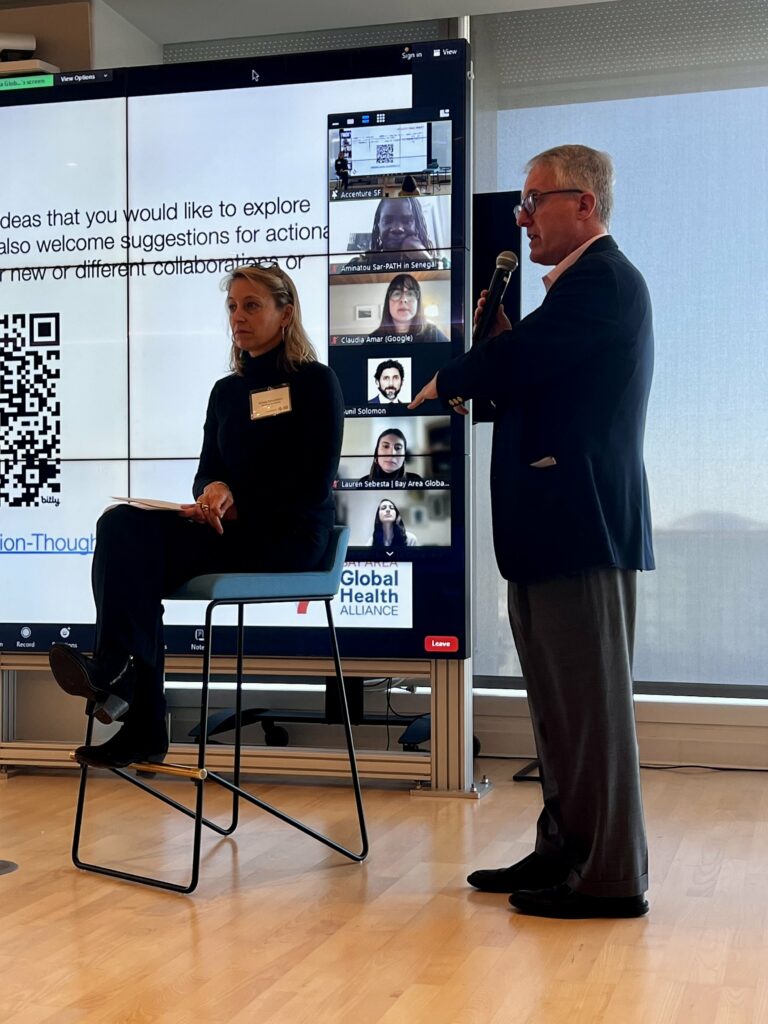
Alliance Board Chair, Colin Boyle and Alliance Board Member, Krista Donaldson welcome attendees to the convening.
Part 1: Insights on Implementation for Equity | October 26
For Part 1 on October 26, Alliance Board Member and Accenture Managing Director Natasha Sunderji, welcomed attendees for joining and turned it over to Alliance Board Chair, Colin Boyle, UC Berkeley, to elaborate on the event’s primary goal of improving multi-sectoral collaboration to ensure that healthcare solutions are ultimately well designed, implemented, and scaled. “There are barriers that prevent sectors from working together. Those barriers don’t have to exist in this discussion,” said Boyle. Director of Medical Affairs at Gilead Sciences, Thu Do, followed up by elaborating on the scope of the initiative, emphasizing the need to discuss working practices multi-sectorally in order to implement them successfully across sectors. “Many of the challenges of healthcare are familiar to other sectors, but we speak about them in siloed terminology, which limits collaboration,” said Do.
Lightning Talks on Key Insights:
Next, moderated by Krista Donaldson, Alliance Board Member and Director of Innovation to Impact at Stanford Byers Center for Biodesign, the event shifted to an inspiring series of lightning talks on forging cross-sectoral partnerships, adapting technology to deliver healthcare goods and services equitably, and implementing programs and policies in new environments via sustainable business models, as well as other topics. The lightning talks featured the following focus areas, members, and key quotes.
There are barriers to adopting cross-sectoral partnerships to solve global challenges and different sectors have unique definitions of program success, but these differences can be embraced to foster learning. (Watch here, 12 min)
- Dilys Walker, Professor, Department of Obstetrics, Gynecology & Reproductive Services at UCSF and Co-Founder of PRONTO International.
- Rushika Shekhar, (Acting) Managing Director, Director of Program Delivery & Operations, Project Last Mile.
Technology and digital platforms create new efficiencies for delivering healthcare goods and services, but also require adaptation to reduce inequities. (Watch here, 15 min)
- Alex Asiimwe, Head of Real-World Evidence Generation and Partnerships, Gilead Sciences.
- Claudia Amar, Strategic Partnerships Development Manager, Health & Search Social Impact, Google.
Program and policy replication falls short in new settings without adaptation to local structures, cultures, and community priorities. (Watch here, 19 min)
- Aminatou Sar, Director, West Africa Hub and Senegal Country Program, PATH.
- Mosa Moshabela, Professor of Public Health & Deputy Vice-Chancellor for Research & Innovation, University of KwaZulu-Natal (UKZN).
Developing sustainable business models is needed to deliver effective care to the most vulnerable to achieve health equity. (Watch here, 7 min)
- Sunil Solomon, Professor of Medicine & Epidemiology, Johns Hopkins University.
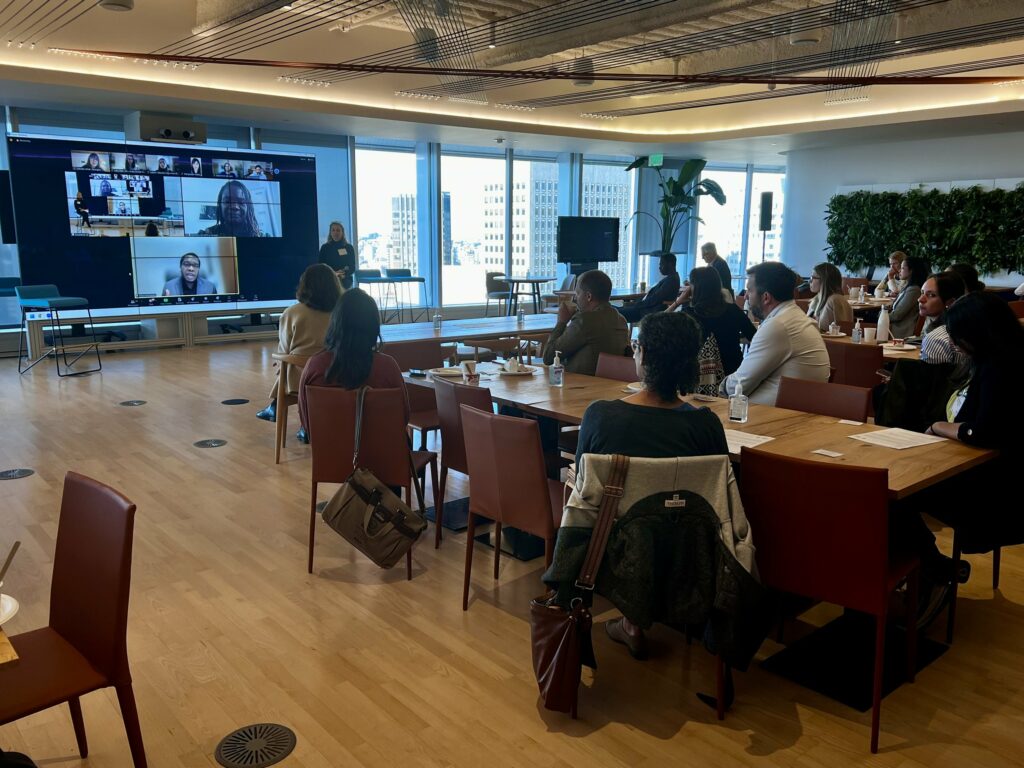
Alliance Board Member, Krista Donaldson welcomes lightning talk speakers.
Key Quotes from Lightning Talks:
-
“In any relationship, opportunities have to be bidirectional. It’s not one side learning from the other. It’s acknowledging and recognizing that everyone has learning and teaching opportunities.” – Dilys Walker, Professor, Department of Obstetrics, Gynecology & Reproductive Services at UCSF and Co-Founder of PRONTO International
-
“Focusing on your partnership foundation before trying to get to scale is key in a successful partnership.” – Rushika Shekhar, (Acting) Managing Director, Director of Program Delivery & Operations, Project Last Mile
-
“In order to develop solutions to reach people where they are, we need to better understand the priorities of global health stakeholders.” – Claudia Amar, Strategic Partnerships Development Manager, Health & Search Social Impact, Google
-
“When we create the space for different entities to talk, we need to acknowledge that it’s not about who we are, but rather, it’s about the people we are serving, and as long as we have that as the bottom line in our conversations, the solutions will come.” – Aminatou Sar, Director, West Africa Hub and Senegal Country Program, PATH
-
“It is private and public partnerships together that can lead to building a big infrastructure in data acquisition and access, which then leads to building digital solutions.” – Alex Asiimwe, Head of Real-World Evidence Generation and Partnerships, Gilead Sciences
-
“The right partnerships can help you navigate how to best benefit the community that you intend to serve.” – Mosa Moshabela, Professor of Public Health & Deputy Vice-Chancellor for Research & Innovation, University of KwaZulu-Natal (UKZN)
-
“When we talk about equity and person-centered models, rather than us just saying it, we need to actually act on what the community wants.” – Sunil Solomon, Professor of Medicine & Epidemiology, Johns Hopkins University
Multi-Sector Small Group Breakout Session:
Following the lightning talks, in-person and virtual attendees dispersed into small group breakout sessions to discuss their collective cross-sectoral experience, thoughts, and recommendations related to the barriers discussed previously. The questions listed below, as well as others raised by attendees, encouraged breakout groups to use their creative energy to brainstorm actionable solutions.
-
How might we create more effective cross-sectoral partnership models to improve the implementation and scale-up of effective health interventions?
-
How might we build trust and increase transparency during the creation of a new partnership?
-
How might we structure and operate within partnerships to make the situation fair for all partners?
-
How might we enable candid conversations among partners to share learnings from successes and failures?
-
How we might re-define program success and rethink incentives to prioritize equity and health outcomes?
-
How might we better enable co-creation of initiatives between key stakeholders?
-
How might we use technology to equitably deliver healthcare services to the hardest-to-reach communities?
-
How might we strengthen local private players to reach those with some ability to pay?
-
How might we develop successful business models for sustainably operating in low-resource contexts to reach the most vulnerable?
When addressing these topics, groups drew from key insights mentioned during the lightning talks, as well as their own expertise. Themes included the importance of implementing clear communication and transparency in cross-sectoral partnerships, prioritizing patients’ needs, developing easy-to-use technology made specifically for local infrastructure, and many more.
These themes, as well as other actionable recommendations, were further explored in a virtual follow up session on Friday, November 3, 2023.
Part 2: Insights to Action Follow-Up Session | November 3
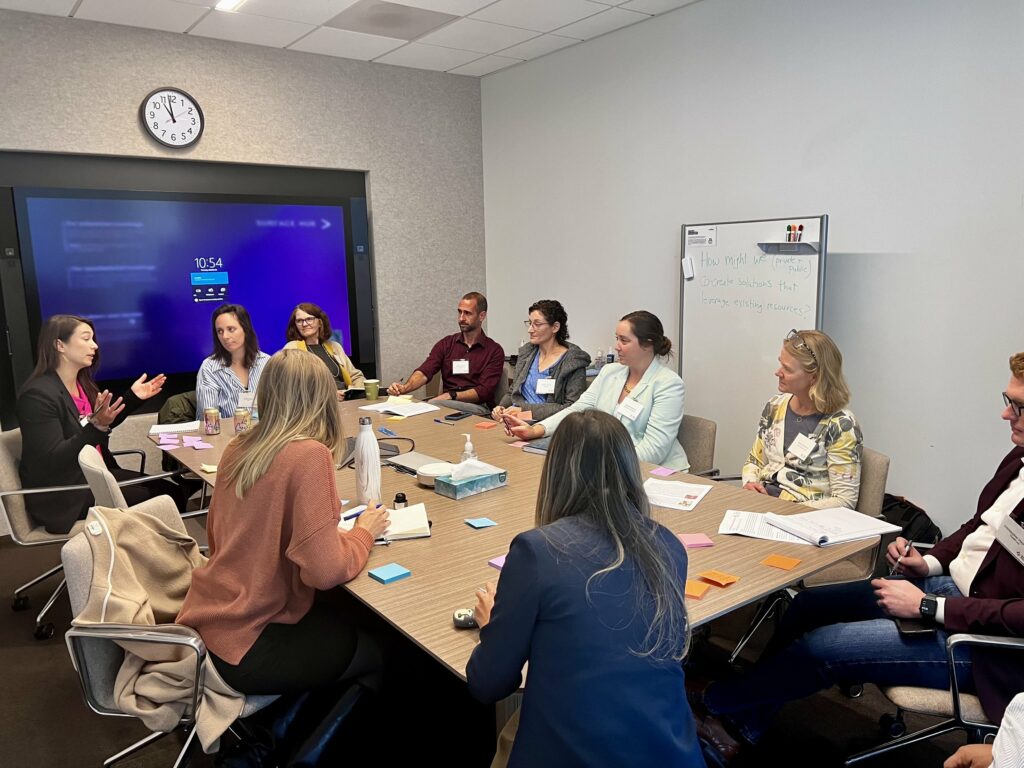
Small group breakout sessions in progress.
One week later, the follow-up event created an opportunity for attendees to further review and discuss best practices for using implementation science to advance health equity goals. The discussions focused on impressions, reactions and questions in response to the October 26, 2023 lightning talks, as well as insights and actionable outputs. Participants were asked to consider how to translate more of the event’s insights into actions, what other insights or output ideas should be explored, and how to reach the people who need to hear these insights, among other thought provoking questions. A few key points raised during the breakout sessions are listed below.
-
Partnerships should be built on trust and entered with a collaborative mindset. They should operate with the needs of the community at the forefront, and when entering a partnership, it is important to understand the difference between the partnership and organizational goals, and how to work through challenges that may arise because of this. (Watch here, 3 min).
-
Capturing and sharing comprehensive data is crucial, as there is a lack of actionable data to share with communities for implementation and clinical use. Encouraging cross-sectoral collaboration and integration of industries is important for bridging the gap between different sectors’ siloed data. (Watch here, 3 min).
-
Technology can create opportunities for improving the delivery of healthcare goods and services, but in order for it to be used successfully, its implementation, partnerships, and scale must be thoughtfully considered in advance. Technology innovations can’t be introduced in isolation and must be a part of a bigger system in order to create these opportunities. (Watch here, 2 min).
Bay Area Global Health Alliance will be developing an Insights Report, with an objective of disseminating insights in a format that is digestible and accessible to readers across sectors. Further, we aim to include a summary of opportunities for further exploration, with proposed action for next steps, when possible.
More information on the topic is available in the pre-read given to attendees. You are also welcome to share your reactions, questions, ideas, or helpful resources here.
If you missed it or would like to hear it again, you can watch the first hour recording of Insights to Action: Ideation on Implementation for Equity here and the follow-up discussion (except the breakout discussions) here.
Stay up to date with the latest on this exploration as well as other Alliance activities and member news by subscribing to Connections, the Alliance’s monthly global health newsletter.
